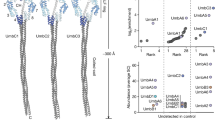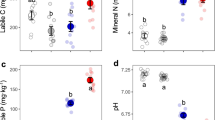Abstract
IN a previous communication1, a plate method for detecting phosphate-dissolving micro-organisms in soil was described. We have now found that a similar technique can be used for work on the breakdown, of silicates by soil micro-organisms. For this purpose the insoluble silicates are ground in a ball mill and directly incorporated into molten agar as described for the insoluble phosphates1.
This is a preview of subscription content, access via your institution
Access options
Subscribe to this journal
Receive 51 print issues and online access
$199.00 per year
only $3.90 per issue
Buy this article
- Purchase on Springer Link
- Instant access to full article PDF
Prices may be subject to local taxes which are calculated during checkout
Similar content being viewed by others
References
Louw, H. A., and Webley, D. M., Nature, 182, 1317 (1958).
Duff, R. B., and Webley, D. M., Chem. and Indust., 1376 (1959).
Pollard, F. H., and McOmie, J. F. W., “Chromatographic Methods of Inorganic Analysis”, 53 (Butterworths Scientific Publications, London, 1953).
Author information
Authors and Affiliations
Rights and permissions
About this article
Cite this article
WEBLEY, D., DUFF, R. & MITCHELL, W. A Plate Method for studying the Breakdown of Synthetic and Natural Silicates by Soil Bacteria. Nature 188, 766–767 (1960). https://doi.org/10.1038/188766a0
Issue Date:
DOI: https://doi.org/10.1038/188766a0
This article is cited by
-
Weak impact of microorganisms on Ca, Mg-bearing silicate weathering
npj Materials Degradation (2021)
-
Hydrochemistry of groundwater contaminated by petroleum hydrocarbons: the impact of biodegradation (Vitanovac, Serbia)
Environmental Geochemistry and Health (2020)
-
Leaching of silica and uranium and other quantitative aspects of the lithobiontic colonization in a radioactive thermal spring
Microbial Ecology (1988)
-
Bio-degradation and utilization of silica and quartz
Archives of Microbiology (1974)
Comments
By submitting a comment you agree to abide by our Terms and Community Guidelines. If you find something abusive or that does not comply with our terms or guidelines please flag it as inappropriate.



